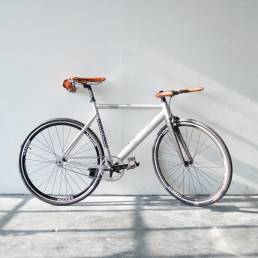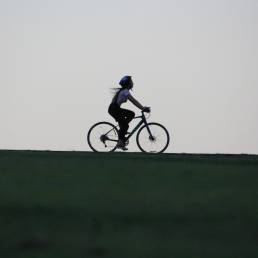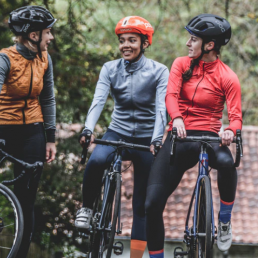Why cycle?
Other than for the sheer fun of it of course.
Your Health
Cycling offers a wealth of benefits, whether you’re commuting, cycling for leisure, or taking part in competitive races. It keeps you active, and helps you keep up a healthy physical and mental wellbeing.
The Environment
The bicycle is not only good for your health, but even for those around you, and there is no better tool to combat climate change. Cycling reduces air and noise pollution, and saves valuable green space from unnecessary development.
Your Time
Have you ever got stuck in traffic, or wasted time going round and round unable to find a parking spot? Cycling saves you all of that hassle, and whether it’s rain or shine, rush hour traffic or a weekend ride, your commuting time will remain constant.
“The most important effect of mechanical contraptions is that they defeat consciousness. Consciousness, self-awareness and development are prerequisites for a life worth living. Now look at what happens to you on a bicycle. It’s immediate and direct. You pedal. You make decisions. You experience the tang of the air and the surge of power as you bite into the road. You’re vitalised. As you hum along you fully and gloriously experience the day, the sunshine, the clouds, the breezes. You’re alive! You are going some place, and it is you who are doing it. Each time you insert you into a situation, each time you experience, you fight against alienation and impersonality, you build consciousness and identity. You try to understand things in ways which are important to you. And these qualities carry over into everything you do”.
– Richard Ballantine, 1972
You may have heard that cycling is good for you but wondered how true that is. One obvious health benefit is the exercise you get when cycling, compared to sitting still in a car or on the bus. Even moving at a slow pace, cycling provides a gentle workout that works your thighs, heart, lungs as well as enhances balance and coordination. Cycling regularly can keep your mind and body young, there are many people who have continued cycling well into their eighties, nineties and beyond.
Cycling is also great for your mental health. Let’s be honest: modern life has become stressful. Exercise in any form helps to reduce anxiety and stress but cycling outside has been shown to be particularly beneficial to the cyclist’s overall state of mind. The simple pleasure of riding a bike can be enough to ease the mind and reduce the risk of depression and mental illness. Cycling regularly also boosts your memory, helps you sleep better and improves both creative thinking and productivity. Cycling can also make you feel good about yourself, the endorphins that come from the physical exercise of riding a bike makes cyclists feel happy.
Cycling is also a great way to meet new people and make friends. Cycle commuters enjoy a sense of community on a daily basis. New cyclists feeling apprehensive about taking to the road are sure to find a more experienced cyclist to help them get started, whilst others plan and meet to commute part of a route together.
Those who choose to cycle instead of drive a car earn a sense of pride by doing their part to protect the environment. At a global level, the resources required to build a bicycle are far fewer than those needed to build a car and results in less use of fossil fuels. At a local and personal level, opting to go by bicycle instead of a car has a double effect on lowering harmful emissions. Firstly one car less on the road saves the emissions of one car. Beyond that however, that same bicycle has saved the space of one car, thus contributing to less traffic and uses one parking space less. Studies have shown that if just 2% of car users switch to bicycles,traffic flow through for cars is improved by a significant 15%.
Reducing your carbon footprint and not adding to the world’s pollution does a wonder for making you feel good about yourself.
Cycling is a very efficient mode of transport in several different ways.
Let’s start with energy. According to MacKay (2008), a human travelling on a bicycle at 16–24 km/h (10–15 mph), using only the power required to walk, is the most energy-efficient means of human transport. One hundred calories can power a cyclist for 5km, but it would only power a car 85 metres!
Next, consider space. A bike has a footprint approximately an eighth that of a car. The bike’s space efficiency can be exploited by urban planners. Fed up with being squashed onto unsuitable pavements? Just imagine the effect of freeing up seven of every eight car spaces for people to walk or talk on. Space efficiency also affects the urban cyclo-commuter. On the road, you can fit where no-one else can. It also means that parking is, for the most part, a non-issue.
Finally, time. Bikes are little affected by traffic conditions, so you tend to average a steady rate. For example In Copenhagen it is 10-20kph. In Malta, where the average journey length is 5km, the corresponding trip time would be 15-30 mins, including parking. Squeezed for time or fancy a lunchtime rendezvous across town? Get on the bike and boom! You’re there before others have even thought about leaving their desk.
How Do I Start?
Getting a bike
First of all, one has to decide whether one wants a standard human powered bicycle or a pedal-assisted (pedelec) bicycle. With a standard bicycle, you move the bike with the power of your own pedalling; with a pedal-assisted bike, a 250W motor can assist you to varying degrees while you are pedalling. This is especially useful if you have to go up hills carrying loads or when you want to travel but do not want to do excessive effort.




Get your money back
Bicycle users may benefit from a number of grants issued by the Government of Malta on the purchase of bicycles, pedelecs and cargo bicycles.
VAT Rebate (Ministry for Finance)
The Ministry for Finance has launched a scheme whereby a once-only grant of 15.25% on the purchase price of the bicycle is refunded, capped at €85 for a bicycle and €250 for a pedelec. One can easily apply online for the grant. Upon application, the applicant will normally receive the rebate after 3 working days.
Pedelec Grant (Transport Malta)
Transport Malta has also launched its Transport Schemes whereby individuals, local councils, NGOs and businesses may apply for grants on the purchase of pedelecs (€400) and cargo bicycles (€2,000). One may apply for this grant by filling up the form linked below and submit it personally at Transport Malta’s offices.
Join our group & find cycling buddies
You may enjoy the independence and freedom of cycling on your own but riding with other people can take your cycling to another level. You can discover new or safer routes and meet new people. Experiencing something on your own is great but having someone else to share it with is a basic human need. Initially, one may feel nervous cycling alone in the busy Maltese roads. A group takes this anxiousness away and you'll become more confident. If you're a novice rider, you will gain all sorts of tips and techniques from what to take on a ride, what to wear in different weather conditions, how to keep your bike roadworthy and much more.



Mythbusters
For any misconceptions you might have been led to believe
Make no mistake, riding a bike through traffic is a dangerous affair. In a collision, chances are it’s going to hurt a lot – at best. On the other hand, crossing the road can also be dangerous. If you do it blindfolded, it’s suicidal. Does that stop you from crossing the road? No, because normally you are not blindfolded and by a combination of attentiveness, knowledge and skill you can enormously reduce the probability of getting hurt.
So it is with cycling. You must be alert to what is going on at all times. You must acquire the art of perceiving and reacting to the warning signs which predict danger, taking action to prevent dangerous scenarios from developing. Of course sometimes unpredictable things will happen, but by and large the outcome of cycling in traffic depends primarily on what you know and do and not on the situation.
The great weather that Malta enjoys, especially between the months of May to October does mean higher daytime temperatures. Here are some tips from our community of cyclists:
- Go slow. Cycling to commute does not have to be fast or furious. By reducing your pace you exert less effort and thus keep your body cooler.
- Time your ride. If you can choose at what time to cycle, early mornings are cooler, even in Summer.
- Stick to the shade. Try to plan routes that take you through streets with trees that offer valuable shade.
- Use your clothes to your advantage. As a guy who cycles to work in a suit, I have learned to carry my jacket and tie in a pannier and I leave my shirt untucked with a couple of buttons open at the top. I plan to arrive slightly early so that I can cool down and tidy up before entering my destination office.
- Last but certainly not least, pedelecs or e-bikes are bicycles that offer the rider assistance when they pedal. You can choose the level of assistance to make more or less effort yourself. These are more expensive than traditional bicycles as they have the added technology of a battery and motor, however the Malta government has for the last years made grants available to reduce the cost to the buyer.
Our island is indeed a hilly place, but that’s what gives us so many wonderful ridges and valleys. Here are some ideas on tackling hills:
- Plan your route. Apps such as komoot allow you to plan a route and you can see in advance the gradient (how steep a hill is). This allows you to try alternative routes that may have easier hills. Alternatively ask on our facebook page and cyclists familiar with your route will be happy to help you find an option.
- Your legs adapt to cycling regularly and become stronger over time, making hills easier to tackle.
- Pedelecs or e-bikes are bicycles that offer the rider assistance when they pedal. You can choose the level of assistance to make more or less effort yourself. These are more expensive than traditional bicycles as they have the added technology of a battery and motor, however the Malta government has for the last years made grants available to reduce the cost to the buyer.
If you have tried cycling with a bag on our shoulder or back you know that while it is certainly possible, it is uncomfortable. You will be amazed at just how much you can carry on a bicycle. Here we run though just some of the options out there:
- Racks attach to the bicycle frame and range from a basket on the handlebar to a mini platform over the rear wheel. These are extremely versatile and range from cheap and cheerful to stronger and more durable models.
- Panniers are bags made specifically for bicycles and clip on the side of the rear or front wheels. You need a rack on the bike on which to clip the panniers but these are not expensive and a worthwhile investment. Panniers range from small capacity cloth bags to high end, large, fully waterproof bags as well as panniers for specific use, for instance there are several good looking ones that double as a courier (laptop) bag or with two straps to wear on your back once you arrive and walk around.
- Cargo bikes/trailers are options for those who need to carry heavier or larger items.
- Carrying children on a bicycle is a wonderful way to bond with your kids and to get them used to an active lifestyle from an early age. This merits a separate article for the future however options include seats with harnesses that strap to the bike frame, either over the rear wheel or more recently in front of the rider. For those with more than one child, trailers are a very good option as they can double up to carry cargo.

